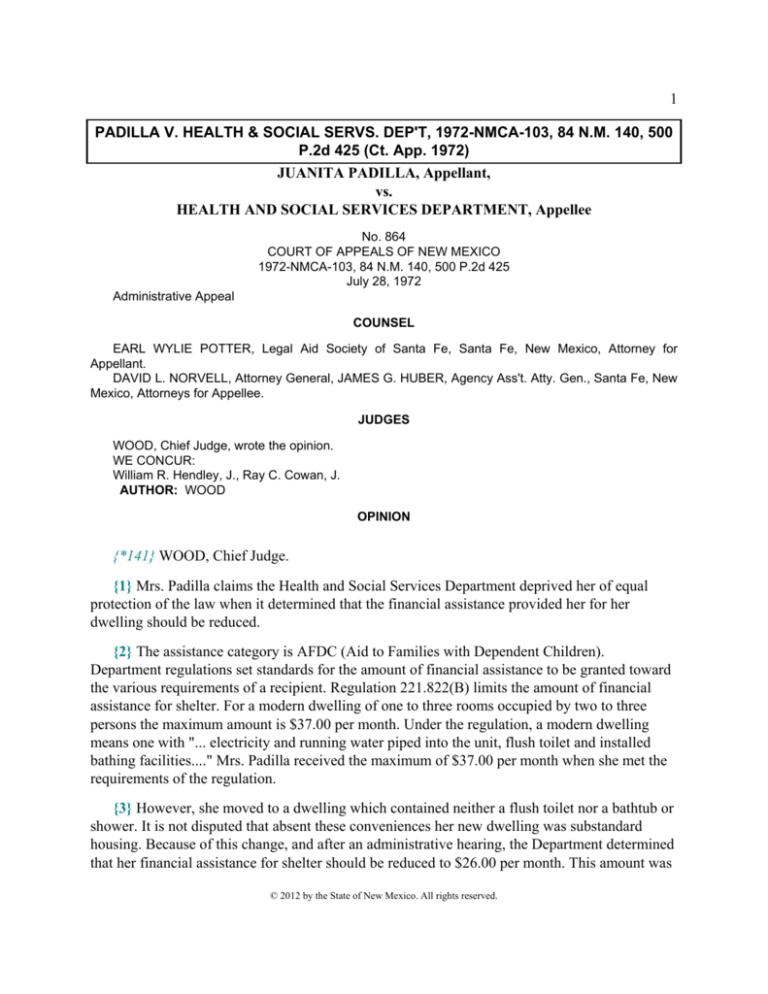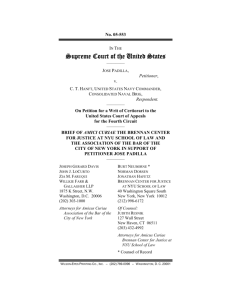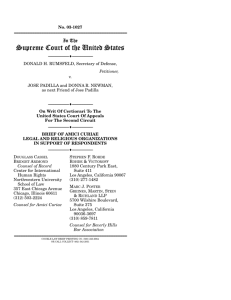
1
PADILLA V. HEALTH & SOCIAL SERVS. DEP'T, 1972-NMCA-103, 84 N.M. 140, 500
P.2d 425 (Ct. App. 1972)
JUANITA PADILLA, Appellant,
vs.
HEALTH AND SOCIAL SERVICES DEPARTMENT, Appellee
No. 864
COURT OF APPEALS OF NEW MEXICO
1972-NMCA-103, 84 N.M. 140, 500 P.2d 425
July 28, 1972
Administrative Appeal
COUNSEL
EARL WYLIE POTTER, Legal Aid Society of Santa Fe, Santa Fe, New Mexico, Attorney for
Appellant.
DAVID L. NORVELL, Attorney General, JAMES G. HUBER, Agency Ass't. Atty. Gen., Santa Fe, New
Mexico, Attorneys for Appellee.
JUDGES
WOOD, Chief Judge, wrote the opinion.
WE CONCUR:
William R. Hendley, J., Ray C. Cowan, J.
AUTHOR: WOOD
OPINION
{*141} WOOD, Chief Judge.
{1} Mrs. Padilla claims the Health and Social Services Department deprived her of equal
protection of the law when it determined that the financial assistance provided her for her
dwelling should be reduced.
{2} The assistance category is AFDC (Aid to Families with Dependent Children).
Department regulations set standards for the amount of financial assistance to be granted toward
the various requirements of a recipient. Regulation 221.822(B) limits the amount of financial
assistance for shelter. For a modern dwelling of one to three rooms occupied by two to three
persons the maximum amount is $37.00 per month. Under the regulation, a modern dwelling
means one with "... electricity and running water piped into the unit, flush toilet and installed
bathing facilities...." Mrs. Padilla received the maximum of $37.00 per month when she met the
requirements of the regulation.
{3} However, she moved to a dwelling which contained neither a flush toilet nor a bathtub or
shower. It is not disputed that absent these conveniences her new dwelling was substandard
housing. Because of this change, and after an administrative hearing, the Department determined
that her financial assistance for shelter should be reduced to $26.00 per month. This amount was
© 2012 by the State of New Mexico. All rights reserved.
2
the maximum financial assistance provided by the regulation for substandard housing. This court
stayed the reduction pending a determination of the equal protection claim. Section 13-1-18.1,
N.M.S.A. 1953 (Repl. Vol. 3, Supp. 1971).
{4} Even though the classification between modern and substandard housing may be
imperfect and may result in some inequality, that classification does not violate the constitutional
requirement of equal protection of the law if the classification has some rational basis.
Dandridge v. Williams, 397 U.S. 471, 90 S. Ct. 1153, 25 L. Ed. 2d 491 (1970), reh. denied, 398
U.S. 914, 90 S. Ct. 1684, 26 L. Ed. 2d 80 (1970); Musgrove v. Dept. of Health and Social
Services, 84 N.M. 89, 499 P.2d 1011 (Ct. App.), decided July 14, 1972. Regulation 221.822(B)
has a rational basis, a distinction in the amount of financial assistance based on the presence or
absence of conveniences in the housing occupied by the recipient of assistance. On its face, the
regulation is not violative of equal protection of the law.
{5} It is not claimed that the regulation has been applied in a discriminatory manner.
Specifically, there is no claim that Mrs. Padilla has been treated differently than other AFDC
recipients occupying substandard housing.
{6} Mrs. Padilla's general claim is that the regulation has been unconstitutionally applied to
her particular situation. Reliance is placed on evidence that Mrs. Padilla moved out of the
modern housing because financially she could not afford to pay the rent; that she could not rent a
modern dwelling with the financial resources available to her. Mrs. Padilla also relies on
evidence that modern housing, as defined by the regulation, was unavailable to a person in her
financial situation. Under these facts, she claims the reduction in financial assistance resulting
from the change from modern to substandard housing deprives her of equal protection because
the reduction "... is in no way related to the need..." of Mrs. Padilla.
{*142} {7} There is no constitutional requirement that New Mexico provide financial
assistance to the needy. The authority for such assistance is statutory. Section 13-1-11, N.M.S.A.
1953 (Repl. Vol. 3). New Mexico has considerable latitude to set its own standard of need and
determine the level of benefits by the amount of funds devoted to the program. King v. Smith,
392 U.S. 309, 20 L. Ed. 2d 1118, 88 S. Ct. 2128 (1968). Section 13-1-16, N.M.S.A. 1953 (Repl.
Vol. 3) states the amount of assistance "* * * shall be sufficient * * * to provide * * * a
reasonable subsistence compatible with decency and health." However, State ex rel. Ellis v.
Heim, 83 N.M. 103, 488 P.2d 1207 (1971) inferentially approves financial assistance at a level
lower than the recipient's unmet need. In providing financial assistance for a category such as
AFDC at a level lower than the standards of need provided for in other categories of assistance, a
state does not deprive AFDC recipients of equal protection of the law. Jefferson v. Hackney, 406
U.S. 535, 32 L. Ed. 2d 285, 92 S. Ct. 1724 (1972). From the foregoing, we conclude the
Department did not deprive Mrs. Padilla of equal protection of the law in providing financial
assistance for shelter in an amount insufficient to cover her unmet need for housing.
{8} Mrs. Padilla's specific claim is that she is deprived of equal protection if she is not given
the shelter assistance provided for modern housing. She asserts that the reduced assistance for
© 2012 by the State of New Mexico. All rights reserved.
3
substandard housing discriminates against her because financially she cannot afford to rent
modern housing. The answer, given by Dandridge v. Williams, supra, is that a classification with
a rational basis does not violate the requirement of equal protection of the law. There is a rational
basis for financial assistance, the amount of which is determined by the conveniences in the
dwelling. This classification obviously results in some inequality when a recipient is financially
unable to obtain housing with the conveniences listed in the regulation. Nevertheless, there being
a rational basis for the classification, there is no deprival of equal protection.
{9} The Department's determination to reduce financial assistance for shelter is affirmed and
the stay in effecting the reduction is vacated.
{10} IT IS SO ORDERED.
WE CONCUR:
William R. Hendley, J., Ray C. Cowan, J.
——————————
© 2012 by the State of New Mexico. All rights reserved.











